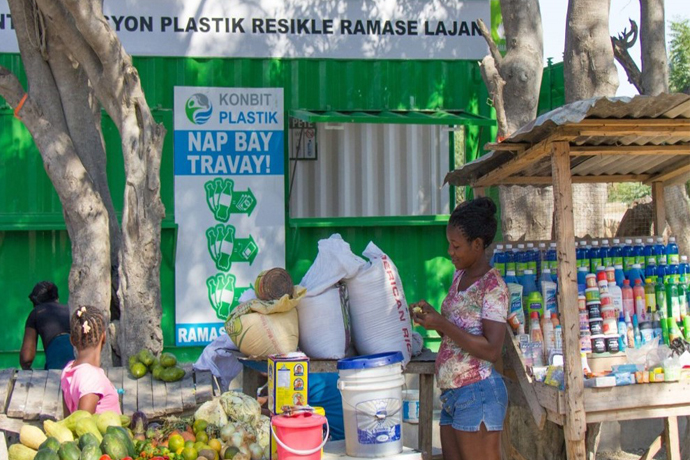Blockchain is a series of data transactions. These transactions are added chronologically as blocks, making up a chain requiring validation by other parties. The data in these blocks can’t be erased or altered, as a result, blockchain is a distributed ledger which is secure and un-hackable. Though commonly associated with Bitcoin and other cryptocurrencies, blockchain technology offers immense opportunities in the field of sustainability.
At GLOBE, speakers and participants discussed four different environmental applications that blockchain could have across various industries, including: recycling, energy, and materials and resources:
- Plastic Bank: Tackling plastic waste and global poverty
- LO3 Energy: Bringing power to the people
- Xpansiv: Transforming the global commodities market
- Consensas: Confidently sourcing natural resources in conflict-affected areas
Plastic Bank: Tackling plastic waste and global poverty
Working with IBM and The Cognition Foundry, Plastic Bank has created a social enterprise which rewards community members for recycling plastic. Operating in Haiti as of 2015, it follows pilots in Peru and Colombia. Community members, often those living in low-income and impoverished conditions, collect plastic and drop it off at a local Plastic Bank processing centre. Using an app, they receive token payments in exchange for the collected plastic. These tokens are kept in a digital wallet that is blockchain securitized (thanks to IBM’s LinuxONE), and can be exchanged for cooking fuel, access to phone chargers, toiletries, and other necessities.
Plastic Bank is currently scaling the model so communities around the world can start creating their own plastic ecosystems. By giving plastic monetary value, the Plastic Bank team is incentivizing the collection of recyclable material and ensuring it doesn’t end up as ocean plastic. The team is currently developing plans for expansion into China, Vietnam, Thailand, and the Philippines, among other countries.
Through partnerships with corporations interested in buying the recycled plastic, such as Henkel, Plastic Bank is also enabling big brands to develop more sustainable packaging for consumer products.
LO3 Energy: Bringing power to the people
Through their Exergy platform, LO3 is disrupting centralized power systems by introducing innovative local micro-grids – localized groups of electricity sources and loads that are often connected with the traditional centralized electrical grid. Through blockchain technology, users of the micro-grid can harness, monitor, and exchange energy within their own community. Blockchain not only securely captures the transactional data, but also empowers people to instantly choose how they want to use the energy in their homes, based on real-time price signals.
Applications of LO3 Energy’s blockchain technology are being implemented around the world, in partnership with Siemens. The most prominent example is the Brooklyn Microgrid, which has given home owners and local businesses the ability to become prosumers, producers, and consumers of the local grid’s affordable renewable energy. Other LO3 Energy projects are being developed in South Australia, Germany, and the United States.
Xpansiv: Transforming the global commodities market
Xpansiv is transforming the global commodities market, which so far has relied heavily on manual approaches for data processing. Driven by a concern over climate degradation, Xpansiv created the Digital FeedstockTM, a digital representation that can be used to track the environmental cost of every unit of energy produced.
Through the creation of the Digital FeedstockTM, Xpansiv leverages distributed ledger technologies to analyze and refine the production data of commodities. This data-driven approach unlocks the true value of each commodity by “de-commoditizing” it, and creating a unique “fingerprint” for each unit of production, which is then published on the blockchain.
Joe Madden, CEO at Xpansiv, believes tracking the environmental impact of commodities through the supply chain in this way, will help consumers make informed decisions regarding the impact of the commodities they purchase. Madden also hopes it will not only help global markets determine whether certain commodities have a high-carbon or low-carbon cost, but also price that environmental impact into the commodity itself.
Consensas: Confidently sourcing natural resources in conflict-affected areas
Companies extracting minerals in conflict-affected areas are under increasing regulatory and consumer pressure to address supply chain risks such as corruption, human rights violations, child labour, gender-based violence, and environmental degradation. Drawing upon key elements of blockchain, Consensas created a system for the mining industry that follows all mining materials through the supply chain. It automates the collection of data required for investor disclosures, compliance and assurance reports on a secure and encrypted platform.
Working with non-profit, IMPACT, Consensas is adapting its technology to help industry ethically source natural resources in conflict areas, while compensating women and men in local artisanal mining communities for providing information on how materials are sourced and extracted. IMPACT’s Just Gold project is the first to successfully bring traceable, legal, and conflict-free artisanal gold from Democratic Republic of Congo to the international market, using a traceability and due diligence system, powered by Consensas.
This article is part of our new six-part content series, “Echoes of the Forum”, which provides exclusive videos, interviews, and key takeaways and actions from our world-leading sustainable business event – GLOBE Forum.
Our first chapter focuses on the role of energy leaders and technology in accelerating the clean economy.
View content

